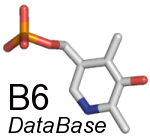|
|
| type |
Journal Article |
| authors |
Ringel MT, Draeger G, Brueser T |
| title |
The periplasmic transaminase PtaA of Pseudomonas fluorescens converts the glutamic acid residue at the pyoverdine fluorophore to α-ketoglutaric acid |
| journal |
J Biol Chem |
| Activity |
ptaa |
| Family |
ptaa |
| sel |
selected |
| ui |
28912270 |
| year |
(2017) |
| volume |
292 |
| number |
45 |
| pages |
18660-18671 |
| | |
|---|
| keywords |
Pseudomonas; enzyme; iron; periplasmic tailoring; pyoverdines; pyridoxal phosphate; siderophore; transaminase |
| abstract |
The periplasmic conversion of ferribactin to pyoverdine is essential for siderophore biogenesis in fluorescent pseudomonads, such as pathogenic Pseudomonas aeruginosa or plant growth promoting P. fluorescens The non-ribosomal peptide ferribactin undergoes cyclizations and oxidations that result in the fluorophore, and a strictly conserved fluorophore-bound glutamic acid residue is converted to a range of variants, including succinamide, succinic acid, and α-ketoglutaric acid residues. We recently discovered that the pyridoxal phosphate (PLP)-containing enzyme PvdN is responsible for the generation of the succinamide, which can be hydrolyzed to succinic acid. Based on this, a distinct unknown enzyme was postulated to be responsible for the conversion of the glutamic acid to α-ketoglutaric acid. Here we report the identification and characterization of this enzyme in P. fluorescens strain A506. In silico analyses indicated a periplasmic transaminase in fluorescent pseudomonads and other proteobacteria, which we termed PtaA for ″periplasmic transaminase A″. An in-frame-deleted ptaA-mutant selectively lacked the α-ketoglutaric acid form of pyoverdine, and recombinant PtaA complemented this phenotype. The ptaA/pvdN double mutant produced exclusively the glutamic acid form of pyoverdine. PtaA is homodimeric and contains a PLP cofactor. Mutation of the active site lysine abolished PtaA activity and affected folding as well as Tat-dependent transport of the enzyme. In pseudomonads, the occurrence of ptaA correlates with the occurrence of α-ketoglutaric acid forms of pyoverdines. As this enzyme is not restricted to pyoverdine-producing bacteria, its catalysis of periplasmic transaminations is most likely a general tool for specific biosynthetic pathways. |
| last changed |
2018/04/03 14:55 |
|











